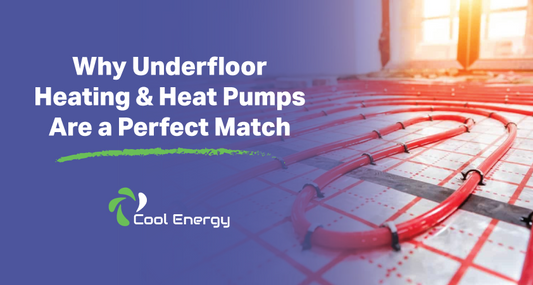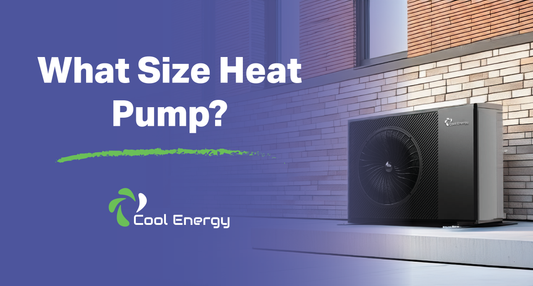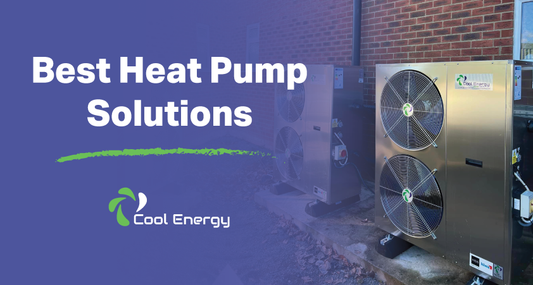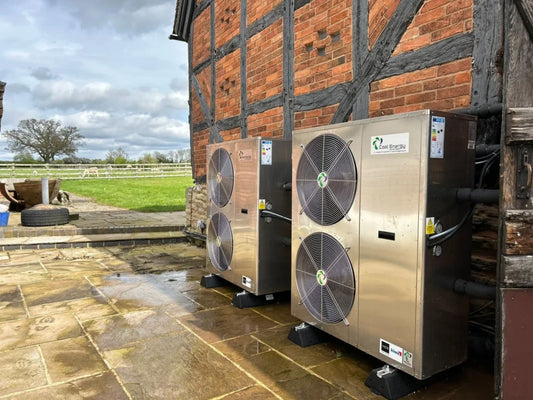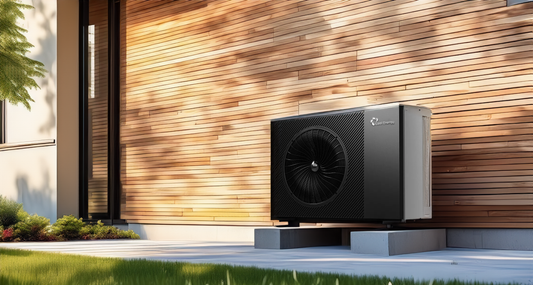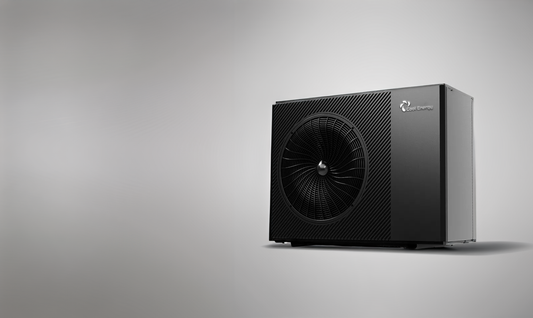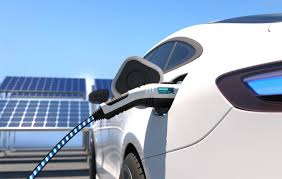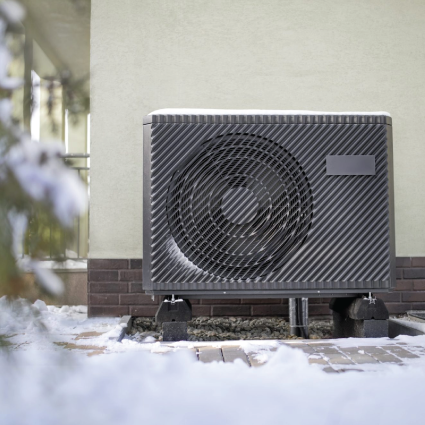
Do Heat Pumps Work in Cold Weather?
Although heat pumps cost a little more upfront than some other heating methods, they are able to turn electricity into three times as much heat.
But air source heat pumps work by drawing warmth from the air just outside your house – so what happens when winter hits and the temperature takes a dive?
In this guide, we’ll explain how heat pumps keep going through the cold weather, when you should and shouldn’t worry, and what you can do to avoid your heat pump freezing in the winter months.
Can an air source heat pump work in cold weather?
Air source heat pumps continue to function when it gets cold outside, and in some cases all the way down to -25°C.
They absorb the warmth that is generated when atoms and molecules move quickly through the air, and that warmth still exists even when the temperature drops below freezing.
Warmth is actually present in all air that has a higher temperature than absolute zero (-273.15 °C), because atoms and molecules continue moving through the air until that point.
Heat pump technology hasn’t quite made it that far – but when you consider that the coldest permanently inhabited place on the planet, Oymyakon in Russia, is -47°C at time of writing, maybe absolute zero isn’t a worthwhile target.
Are heat pumps less efficient when it’s cold?
Air source heat pumps usually lose efficiency as it gets colder, as they have to use more energy to draw warmth from the air. When there’s less warmth in the air, it takes more effort to gather it.
They start at a high bar though, since air source heat pumps are 300% to 400% efficient on average.
This means that at 300% efficiency, a heat pump produces three units of heat for every unit of electricity they use – which is three times better than a gas boiler.
This rate can fall to around two units when the temperature drops below 0 degrees Celsius (°C).
Heat pump efficiency is measured in units called ‘coefficient of performance’ (CoP), which is calculated by dividing the heat output of the heat pump by the energy input.
To illustrate what that means in terms of efficiency, if a heat pump’s CoP is around 3 at 0°C, that means it’s operating at 300% efficiency. Essentially, the higher the CoP, the more efficient the heat pump is.
The table below shows how the average air source heat pump’s efficiency changes based on the outside temperature:
| Outside Temperature | Coefficient of Performance (CoP) |
|---|---|
| 15 °C | 4.3 |
| 13°C | 4.1 |
| 10°C | 3.9 |
| 7°C | 3.7 |
| 4°C | 3.3 |
| 2°C | 3.1 |
| -1°C | 2.9 |
| -4°C | 2.6 |
| -4°C | 2.5 |
| -9°C | 2.4 |
| -12°C | 2.3 |
You can make your heat pump more efficient with regular maintenance, and by ensuring it has no exposed pipework.
What is the best weather for a heat pump?
Air source heat pumps work best when the weather is hot, as that means there’s an abundance of heat in the air that can be absorbed and used to heat your home.
In hotter locations, you’d generally rather have an air source model than a ground source heat pump, as you’ll be able to take full advantage of temperatures above 20°C.
The best heat pumps for cold climates
The great majority of air source heat pumps are also designed to work in freezing conditions, down to at least -10°C.
That’s more than sufficient for most customers in the UK.
Some heat pumps can even supply your home with warmth when the mercury plummets as low as -25°C.
The UK has only ever experienced temperatures lower than -25°C on four occasions, and not since 1995, so any of these models should suit you just fine.
Are hybrid heat pumps better for winter?
A hybrid heat pump could be a better option for winter if you live in a poorly insulated home that struggles to retain warmth.
This is because in a hybrid system, the boiler portion is designed to act as a backup to the heat pump, if it’s struggling to heat the home in very cold weather. The heat pump should still be able to provide around 80% of the overall heating however.
That being said, most UK homes can be made suitable for a regular heat pump by improving their insulation, and switching small radiators for large ones.
Are heat pumps popular in cold countries?
Heat pumps are extremely popular in cold countries.
In fact, the top four European nations with the most heat pumps per person – Norway, Sweden, Finland, and Estonia, respectively – are some of the chilliest places on Earth.
In Norway, where the average winter temperature is -6.8°C, an incredible one in four people own heat pumps.
And the European countries moving the quickest to adopt heat pumps are Lithuania and Poland – which are also among the coldest, with temperatures often falling below freezing.
Can your heat pump freeze in winter?
Your heat pump can freeze in winter, though if this starts to happen, its defrost mode should automatically activate and stop the spread of ice through its system.
If this doesn’t happen, it means something’s gone wrong.
Possible explanations include broken sensors, low levels of refrigerant, or even that leaves and other debris are blocking the heat pump’s vents.
Top up the refrigerant, make sure the vents are clear and check the sensors. If the machine is still frozen a couple of hours later, contact your heat pump’s manufacturer.
Make sure that the heat pump is truly frozen though – if it’s just covered with snow and ice, that’s normal, and shouldn’t affect its inner workings.
Do you need a cover for your heat pump?
You don’t necessarily need a cover for your heat pump, and there’s some debate about whether these make a difference.
The argument in favour of a heat pump cover is that it protects the external unit from rough weather, such as strong winds or heavy snow. A cover might also reduce the chance of a heat pump freezing in the winter.
How do I know if there’s a problem with my heat pump in winter?
To know if there’s a problem with your heat pump in the winter, you need to look out for a few key warning signs.
- The heat pump is creating little heat, or blowing cold air – it might simply be that there is an ice build-up on the outdoor unit, but it could also indicate a problem with the compressor, a valve, or the refrigerant.
- The heat pump has constant ice build-up – heat pumps periodically defrost by heating up their outside coils. If ice is building up, it could indicate a problem with the controls, with the fan, or that the refrigerant is running low.
- Your energy bills are rising sharply – it’s normal for energy bills to go up in winter, but if you see an abnormally high rise, it could be a sign that your heat pump is overworking itself. This might mean you have the wrong size unit for your home.
Contact us today for more information or to get a quotation on a heat pump system for you.
Email: sales@coolenergyshop.com
